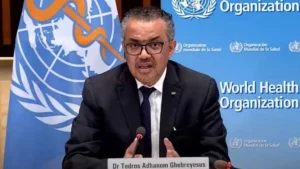
[ad_1]
Latest phrases from Tedros Adhanom Ghebreyesus, head of the World Well being Group (WHO), have stirred worries worldwide in regards to the company’s pandemic treaty efforts.
Doubts are rising as folks query WHO’s actual objectives.
Tedros aimed to calm fears, saying the treaty would enhance international well being and equity, not simply empower WHO.
But Dr. Peter McCullough, a prime professional, warned it would result in undue international management, veiled as useful intentions.
He harassed that the treaty might erode nationwide management and lacked openness.
The treaty, beneath evaluate by WHO‘s 194 nations, seeks to raised deal with future pandemics. It suggests binding guidelines forcing nations to comply with particular well being measures.

Critics concern these guidelines might restrict freedom, pushed by unelected officers with out clear justification.
WHO’s reliance on personal funding, which makes up 85% of its price range, sparks debates about its autonomy.
The priority is that donor affect might sway WHO away from the general public good, favoring political motives as a substitute.
The treaty proposes broadening “pandemic” and “well being emergency” definitions, making well being tips obligatory, and giving the WHO chief extra energy to declare emergencies.
It additionally recommends monitoring member states, sharing knowledge, and permitting WHO to handle nationwide sources, together with cash and patents.
As well as, this WHO initiative faces international pushback, difficult its goal for health-based international affect.
The resistance displays rising mistrust in vaccine mandates and concern of unilateral well being narratives, exhibiting a neighborhood cautious of world directives missing a strong foundation.
This opposition is a notable hurdle for once-unchallenged authorities, tackling perceived overreach within the identify of well being and safeguarding nationwide and particular person freedoms.
[ad_2]